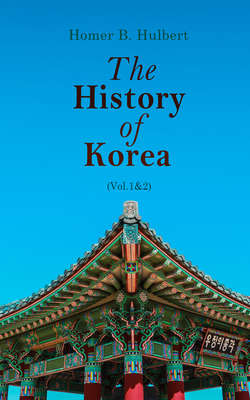Читать книгу The History of Korea (Vol.1&2) - Homer B. Hulbert - Страница 28
На сайте Литреса книга снята с продажи.
Chapter V.
ОглавлениеTable of Contents
Rebellion quelled … cannibalism … anarchy. … “faith cure” … reformation. … Ta-na well … the Queen restored … slaves revolt … the Mongols … envoy killed. … Kin weakens. … Kitan refugees … civil strife. … Kitan driven back. … Mongol allies. … Mongols drive Kitans into Koryŭ. … Mongol savages. … Kitan remnant surrenders. … Mongol envoy … jealousy. … Mongol demands … rebels’ heads sent to Song-do. … Mongol demands tribute … brutal envoy … a new wall. … Japanese pirates. … Mongol envoy killed. … Mongol allies … driven back … prime minister duped … pirates again … a Korean “Shogun”. … Mongols cross the Yalu … a Mongol letter … the Mongols reach Song-do … leave it untaken … the “Shogun” flees … a brave prefect. … Mongol terms. … King surrenders. … Mongol residency.
Cho Wi-jong was a P‘yŭng-yang man with a towering ambition, and he now deemed the time ripe to put the wheels in motion. He therefore drew about him a strong body of troops. All the districts about P‘yŭng-yang joined him excepting Yŭn-ju, which remained loyal to the king. The people of that place were afraid of the rebel but the loyal prefect Hyŭn Tŭk-su forged a letter purporting to be from the royal army en route for P‘yŭng-yang. This gave the people courage to hold out.
Cho and his troops marched toward Song-do and encamped not far to the west of the town. Gen. Yi Eui-bang, having first seized and killed all the P‘yŭng-an officials who happened to be in the capital, marched out against the rebels. At the first attack the seditious force broke and fled. Gen. Yi chased them as far as the Ta-dong River. He crossed that river and lay siege to P‘yŭng-yang; but winter was coming on and he was obliged to retire to Song-do. Cho then made two or three attempts to overthrow the loyal town of Yŭn-ju, but without success.
Gen. Yi was a ruthless man, who had no love of humanity in him, but would kill his best friend if it served his purpose. For this reason Gen. Chöng did not dare to associate with him, but threw up his commission and went into retirement. His son got a priest to dog the footsteps of Gen. Yi and wait for a chance to kill him. This he finally accomplished and Gen. Yi and many of his relatives were killed; and the queen, who was his daughter, was driven away.
As Cho Wi-jong, the P‘yŭng-yang traitor, was gradually losing power he desired to get help from the Kin emperor. For this purpose he sent two envoys, but one of them killed the other on the way and them fled to Song-do. Cho sent another, but him the Kin emperor seized and sent a prisoner to the Koryŭ capital. In the spring the royal forces besieged Cho in P‘yŭng-yang again and famine within the walls became so great that men ate each other. Many of the towns-people came out by stealth and as they were well received by the besieging force, well-nigh all the civilians in the city came over the walls by night. When the city fell, Cho was killed and his wife and children were sent to Song-do where they were hung in the center of the city.
The rebel forces were scattered but reunited in various places and terrorized the whole north, so that envoys to the Kin court had to go a round-about way to avoid them. The whole country in fact was in a state of anarchy. In the south whole sections of the country were disaffected toward the government and bands of men roamed the country. There was a rising also in Whang-hă Province. In P‘yŭng-yang the people rose and drove out the governor. The king was forced to begin the correction of abuses. He sent all about gathering information as to how the people were governed and as a consequence eight hundred officials were cashiered. But the attempt at renovation came too late. In the west the bands of robbers looted right and left and could not be apprehended. The capital itself swarmed with thieves. The ancestral temple itself was robbed of its utensils. But all this time the king kept up a round of carousals and debaucheries at which he himself played the buffoon, and danced for the delectation of his guests, and that too at a monastery. A sacred place truly!
